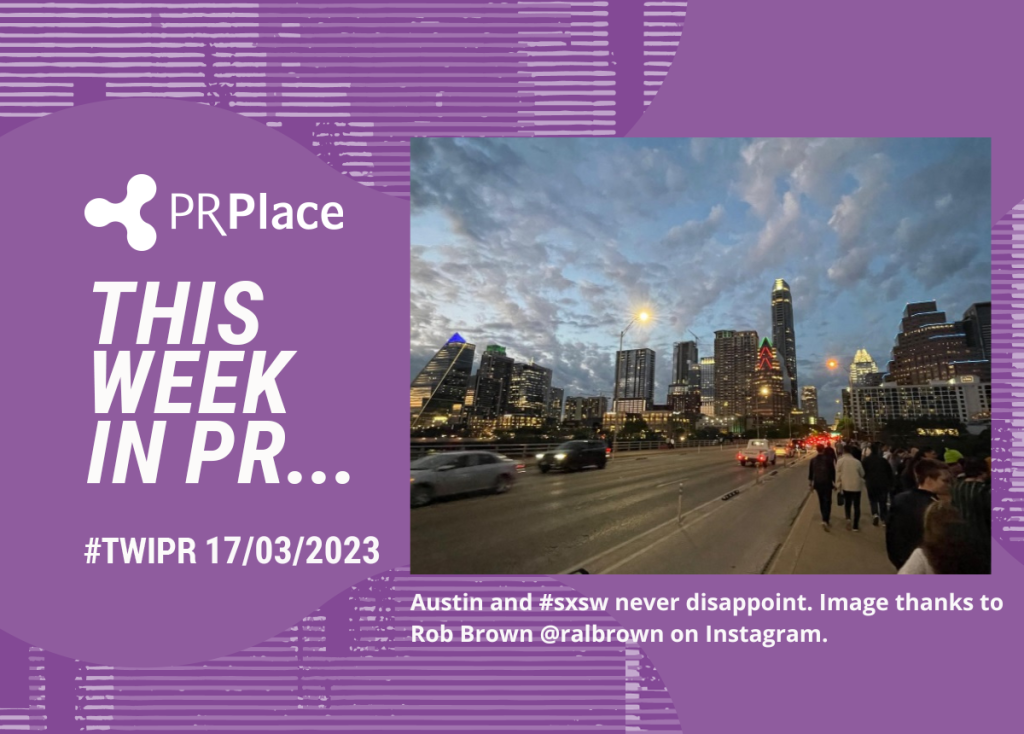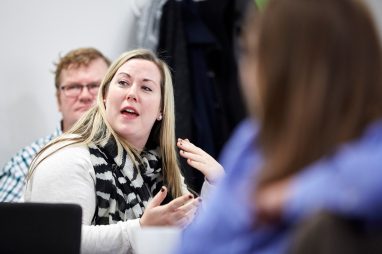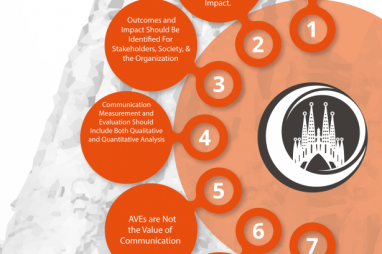This week in PR (17 March)

About the author
Richard Bailey Hon FCIPR is editor of PR Academy's PR Place Insights. He teaches and assesses undergraduate, postgraduate and professional students.

It happened this week
Today the PRCA Board has been informed that Francis Ingham has passed away after a short illness. Our thoughts and prayers go out to his family and friends at this incredibly difficult time.
PRCA Statement: https://t.co/MFZjAhSQnr
— PRCA (@PRCA_HQ) March 16, 2023
- Alex Malouf: Memories of Francis Ingham (17 March)
‘Knowing Francis, he would be delighted by all of the praise that he’s been receiving online. And he’s always loved making headlines, be it now or with the expulsion of Bell Pottinger or his comments on Ukraine and Russia.’ - Andrew Thomas: Francis Ingham, PRCA director-general, dies following a short illness (16 March)
‘When Francis took over the PRCA it was in a dreadful state… He seriously considered trying to get his old job back at the CIPR, but ultimately decided to make the PRCA work.’
Profession
- Paul Holmes: The Pharmaceutical Industry Is Its Own Worst Enemy (14 March)
‘The principle here, of informed consent, should apply to everything public relations firms do: provide the audience with all the information they might find useful in making a good decision, particularly whether the source of information and advice has been funded by specific interests.’
Purpose, climate and ESG
The new CIPR ESG Panel launches today with a series of events on environmental, social, and governance issues.
Find out more about the work of the Panel from Chair @suzygilesglobal and register for their upcoming events:https://t.co/FK4UJjhhD1#CIPRESG pic.twitter.com/TFciryHQ3z
— Chartered Institute of Public Relations (@CIPR_Global) March 13, 2023
- Tim Le Couilliard: Larry Fink’s latest letter (16 March)
‘In the letter, Fink said that asset managers must *not* be the “environmental police”, and instead called for “governments to make policy and enact legislation, not companies”.’ - Steffan Williams: Risky Business (no date)
‘Governance is paramount in any organisation and in a financial institution the chief risk officer has a vital role. Success can be temporary and strategy should always be provisional. You must stay ahead of internal and external threats and opportunities.’ - Michael White: CEOs on LinkedIn increase personal posts amidst geopolitical tension and declining living standards (13 March)
‘Silence is not an option, especially as CEOs are often regarded as mouthpieces to bring credibility and perspective to difficult issues. However, despite 2022 being the year of two COP Summits, CEOs experienced a dip in engagement around sustainability topics. This also suggests a possible fatigue around ESG messaging or else a shift in what audiences expect to hear from corporate leaders.’
A packed house in Bristol today for #Purposefest! What a joy to be surrounded by a room filled with #purposedriven business owners and the @BCorpUK community. pic.twitter.com/5IDPdM4riW
— Second Mountain Comms (@2ndMountainUK) March 16, 2023
Consulting, skills and careers
- Emma Drake: Are you doing your homework? 5 ways to improve your PR strategy using competitor analysis [podcast] (16 March)
‘When planning a PR campaign, it’s essential to have a clear understanding of the competitive landscape.’
Gender, diversity and wellbeing
- Ali Maynard James: Pregnant then… supported? (15 March)
‘The expected (and hugely welcomed) announcement today could not only help young families but could be a monumental change for women returning to work and fulfilling those all-important leadership roles.’
- Stephen Waddington: Socially Mobile reports on graduate career progression (15 March)
‘The Socially Mobile Community Interest Company was founded in 2020 by myself and Sarah Waddington CBE. Its aim is to deliver management training to public relations practitioners from lower socio-economic backgrounds and under-represented and under-served groups.’
- Sara Thornhurst: When a non-visible disability becomes visible (10 March)
‘As the three year mark of having Long Covid approaches, I’ve been slowly trying to pick up the pieces and stitch them together to create some kind of new life.’
Public and third sectors
Are you thinking about your #SocialMedia guidelines after hearing the Gary Lineker story?@zoeamar has shared some advice to consider such as:
– Design it with, not for them
– Discuss your values before a crisis hits
– Review your governance https://t.co/Po4qb2DOov— CharityComms (@CharityComms) March 14, 2023
Politics, public affairs and public sphere
Sunak and Hunt achieved a measure of success with yesterday's Spring Budget, addressing cost-of-living pressures, business investment and labour shortages. Yet, challenges remain with real household incomes forecasted to fall.
Read the full analysis from @Edelman_EGA:
— Edelman UK (@EdelmanUK) March 16, 2023
- Dafydd Rees: Credit Suisse and SVB: finding the best defence for fear and failure (16 March)
‘Fifteen years ago, running the Business desk at Sky News, I found myself striving to make sense of the upheaval and uncertainty of the Global Financial Crisis. It feels like only yesterday.’ - Louie Freeman-Bassett: The UK Budget: a shot in the arm for the global ‘science superpower’ vision (16 March)
‘Alongside the tax incentives designed to nurture SMEs and retain big business, was an important development in the drug approval process aiming to continue the re-integration of the UK into a global network of regulatory partners.’ - Simon Neville: SVB is gone. But what happens next? (14 March)
‘Was this a rogue operation? Or is this the start – as some in the City are suggesting – of a repeat of the 2008 financial crash? Speak to those in banking last Friday, the comparisons with the global financial crisis were clear for many to see.’
- Hugh Matthews: #TradeTuesday: “The long goodbye” – progress review on the UK’s regulatory divergence from the EU (14 March)
‘The UK Government is aiming to create a political and legal divergence between UK and EU law, to give UK businesses a competitive advantage.’ - Stuart Thomson: Interview with Rebecca Deegan, I Have A Voice [podcast] (11 March)
‘I absolutely fell into public affairs. I was working in policy, wondering what is this dark art that’s happening over here?’
Brands, content, community and creativity
Research, data, measurement and evaluation
- Claire Munro: Book Review: PR Technology, Data and Insights (15 March)
‘There’s a walkthrough on how to implement the author’s signature models, the public relations continuum and landscape analysis, which provide a framework to build a data driven, clearly planned and measurable campaign.’
Crisis, risk and reputation
- Sheena Thomson: Business Risk Tracker 2023 – Spring Pulse Survey Results (16 March)
‘Before the pandemic, many organisations focused on a linear approach towards running their organisations. Since the pandemic and the invasion of Ukraine, however, a more volatile and complex environment is emerging that requires a flexible and adaptive approach to strategy execution to make decisions faster, and react quickly to changing circumstances.’
- Charlotte McGill: How leadership and communication can help navigate a crisis (15 March)
‘With the crisis playing out so publicly for all to see, it can be all too easy to focus on external communications – what the media is reporting, what the public is saying. However, a crucial element that shouldn’t be overlooked is an organisation’s internal communications.’
- Crispin Thorold: The Human Imperative: Safeguarding Team Wellbeing In A Crisis (14 March)
‘When it comes to well-being in a crisis, rank must be left at the door – the whole team has to support each other, whatever their position in the hierarchy.’ - Alice Humphreys: How not to do crisis comms: a Beeb masterclass (13 March)
‘As Lineker’s Tweet started to send shockwaves through the media, a pre-agreed protocol and dedicated crisis team should have leapt into action, rolling-out a well-rehearsed damage limitation exercise.’ - Amanda Coleman: It started with a tweet (13 March)
‘This may be labelled as a ‘pr crisis’ but for me it is not. This is about a lack of understanding about policies and a personal decision to take a course of action. If we unpick it this was a problem before any communication of it took place. It is one of my big frustrations that we accept the label ‘pr crisis’ for situations where organisations and others have failed.’
Behaviour and influence
- Orlagh Shanks: Will The De-Influencer Put Me Out Of A Job? (13 March)
‘Even though I work in influencer marketing and this is my bread and butter, I see the ‘de-influencer’ as a breath of fresh air.’
Internal communication
- Martin Flegg: Igniting change (16 March)
‘Planned change, often delivered through projects, usually needs an equally formal and planned communication approach, whereas emergent (or viral) change might need a communications approach which is much more fluid and adaptive.’ - Jenni Field: Why Communication Is The Antidote To Organizational Chaos (14 March)
‘You can’t maintain good relationships and create a flourishing workplace without excellent communication to combat any confusion. Organizations are comprised of people and for organizations to thrive, people need to work well together.’
Media, digital and technology
- Guy Clapperton: Newsjacking – does it backfire? (15 March)
‘You can go too far with so-called “newsjacking”, and if everyone else is saying something about a particular topic (particularly if the comments are becoming anodyne) it could be a good time to talk about something else.’
- Drew Benvie: In light of Lineker: why every company should have a staff social media policy (14 March)
‘You might not fall foul the same way as the BBC and Lineker have, but every company has the potential to get into hot water if someone says the wrong thing in the wrong place. And with 4.6 billion active social media users in the world, everyone would benefit from getting their house in order.’ - Dan Slee: LIKE SHARE: What industry wide social media engagement metrics look like in 2023 (11 March)
‘Engagement rates for TikTok are 5.6 per cent – that’s comfortably the largest social channel… Higher education is comfortably the leader here with an astonishing 16.9 per cent engagement rate.’
BREAKING: The UK Government just banned TikTok on work devices with immediate effectpic.twitter.com/RxEFxhRLDU
— Matt Navarra (@MattNavarra) March 16, 2023
Academic, education and training
#prstudent #CreatorAwards23
https://twitter.com/sarahjaynepr/status/1636016051656728576
- Susan Omodiale (Leeds Beckett):
@godmotherlondon On mondays I have my Digital Communications workshop by 12-2pm and lectures by 3-4pm. #prstudent today I decided to have brunch at #TheHive before jumping into the 12-2pm class and decided to share this space with you. I usually more often than not find myself here before or after classes. #TheHive is a space in uni that creates community for students to relax, have a few bites, get hydrated and unwind. As a #prstudent, unwinding is something i’ve learnt is important when navigating study/work/life balance. #prstudent #leedsbeckettuniversity #dailyvlog #leeds Escapism. – Super Sped Up – RAYE - Nafatiti Nimako-Boatey (Leeds Beckett): What I do & don’t know about PR! (13 March)
‘Whenever I’m met with the question, ‘so what course are you on?’ I shudder a little bit. Only because I know the inevitable follow up questions.’
- Aileen Guing (Leeds Beckett): What’s Stopping You? (13 March)
‘Not saying this as an excuse, but cultural upbringing plays a big part here, especially in an Asian society where you need to tiptoe all the time. Students are not supposed to question their teachers. Younger people are considered rude when they speak up their minds to those older than them.’


